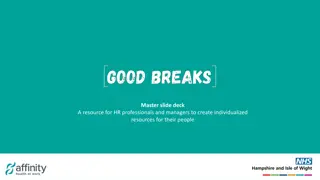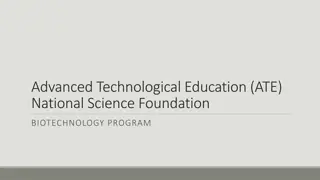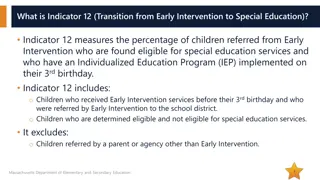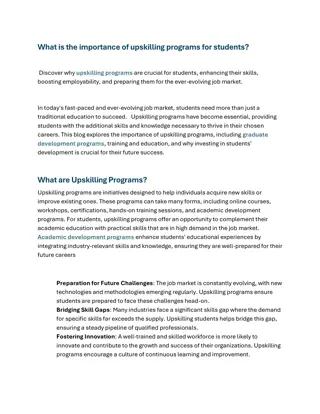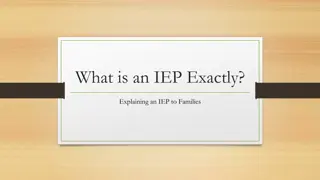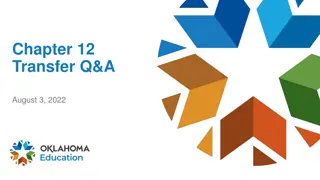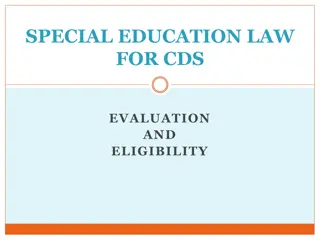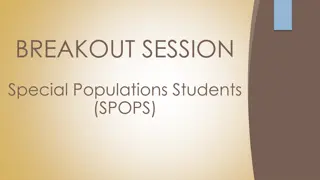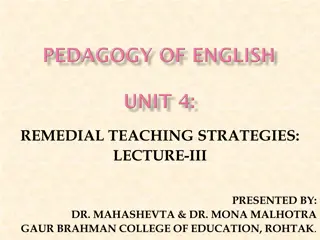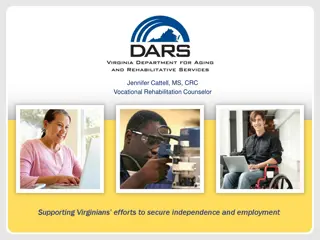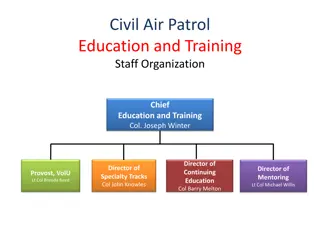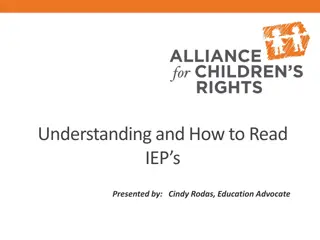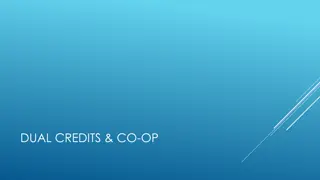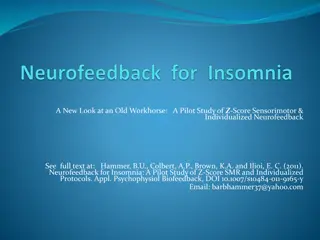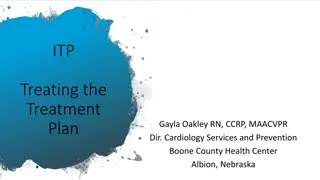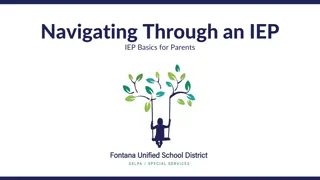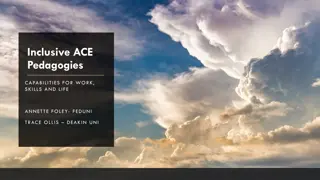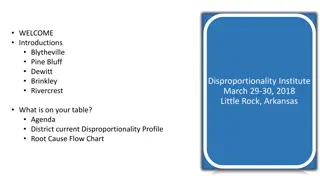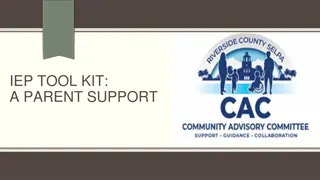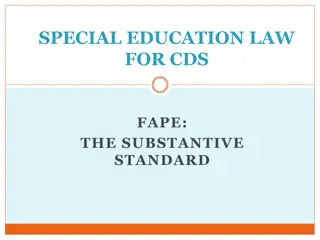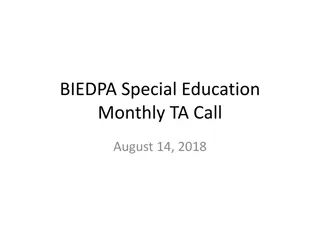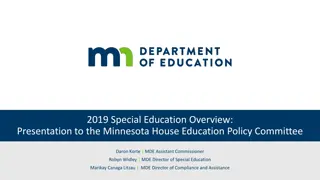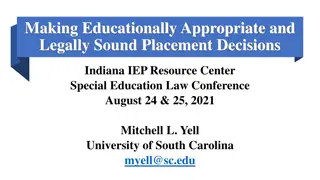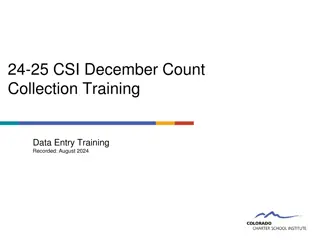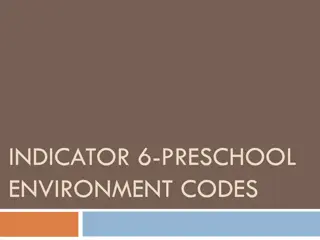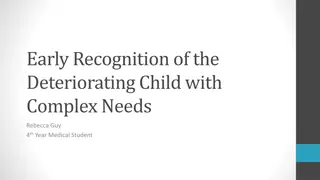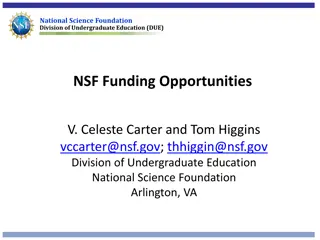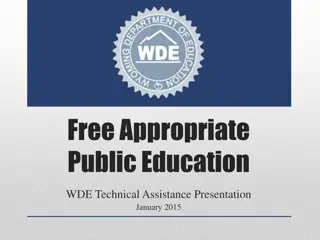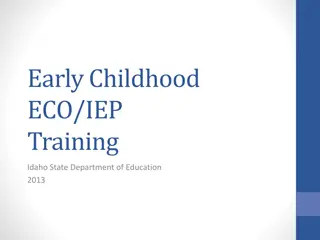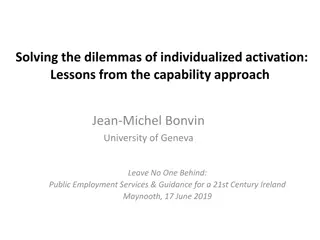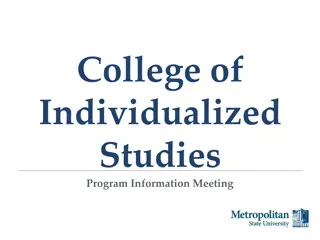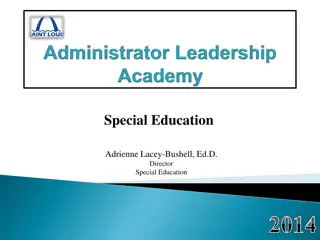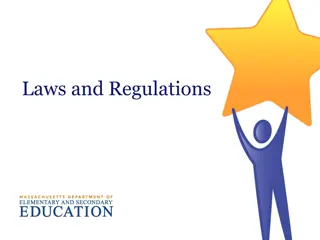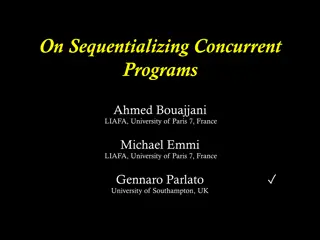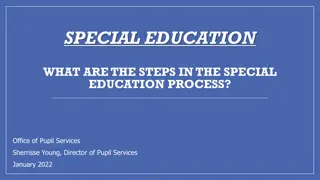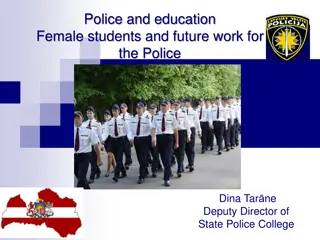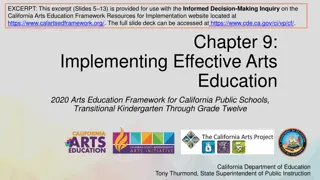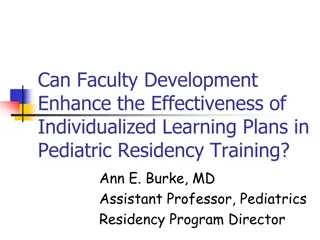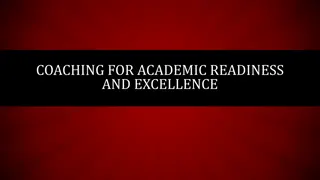Creating Individualized Resources for Employee Breaks in HR Management
Providing a master slide deck resource for HR professionals and managers to tailor individualized break strategies for their teams. The content covers the importance of breaks, ways to encourage and optimize breaks, and strategies at the individual, group, leader, and organizational levels. Breaks a
0 views • 69 slides
Biotechnology Education Programs in High Schools
The Advanced Technological Education (ATE) National Science Foundation Biotechnology Program provides funding for various biotech education initiatives in high schools. These programs aim to create STEM awareness, offer hands-on experiences, and provide career guidance to students. Grant-funded prog
2 views • 5 slides
Understanding Indicator 12: Transition from Early Intervention to Special Education
Indicator 12 measures the successful transition of children from Early Intervention to Special Education by evaluating the percentage of children referred from Early Intervention who are found eligible for special education services and have an Individualized Education Program (IEP) in place by thei
1 views • 6 slides
What is the importance of upskilling programs for students?
Discover why upskilling programs are crucial for students, enhancing their skills, boosting employability, and preparing them for the ever-evolving job market. \n\n \n\nIn today's fast-paced and ever-evolving job market, students need more than just a traditional education to succeed. Upskilling p
0 views • 2 slides
Understanding Individualized Education Plans (IEP) for Student Support
Individualized Education Plans (IEP) are tailored documents developed for students with special needs, providing a roadmap for educational support. The process involves assessments by a team including parents, teachers, and administrators. Parents can request an assessment for special education serv
1 views • 23 slides
Guidelines for Student Transfers and IEPs in Oklahoma Schools
This document outlines procedures for student transfers in Oklahoma schools, specifically focusing on transfers for students with disabilities. It covers aspects such as transferring students with expired IEPs, revocation of disability recognition, and the process for move-in students within the sta
0 views • 7 slides
Special Education Law and Evaluation Process for CDS Eligibility
Understanding special education law and the evaluation process for Children with Disabilities (CDS) is crucial for determining eligibility, developing Individualized Education Programs (IEPs), and monitoring progress. Key steps include IDEA requirements, obtaining informed consent, conducting evalua
0 views • 28 slides
Understanding Special Populations Students in CTE Programs
Special Populations Students in Career and Technical Education (CTE) programs include individuals with disabilities, economically disadvantaged individuals, single parents, English Language Learners, migrants, homeless individuals, and more. These students may require Individualized Education Progra
0 views • 9 slides
Effective Remedial Teaching Strategies for Education Enhancement
Remedial teaching strategies focus on individualized education plans, peer support programs, and reward schemes to address learning difficulties and enhance students' potentials. These strategies aim to provide tailored support, reinforce foundational learning, improve communication skills, and boos
2 views • 11 slides
Vocational Rehabilitation Services and Pre-Employment Transition Programs
The Department for Aging and Rehabilitative Services (DARS) in Virginia aims to improve employment opportunities and quality of life for older Virginians and individuals with disabilities. Through the Division of Rehabilitative Services, DARS offers vocational rehabilitation and pre-employment trans
1 views • 15 slides
Mentoring and Education Staff Organization in Civil Air Patrol
The Civil Air Patrol's Education and Training staff organization includes various positions such as the Chief Education and Training Officer, Directors of Mentoring, Continuing Education Superintendent, and more. The staff is responsible for overseeing mentoring programs, continuing education initia
0 views • 6 slides
Understanding and Reading Individualized Education Plans (IEPs) by Cindy Rodas: Key Insights
Gain valuable insights on understanding and reading Individualized Education Plans (IEPs) through this educational presentation by Cindy Rodas, an Education Advocate. Learn about the components of IEPs, examples, and essential tips. Explore topics such as the basics of Special Education, identifying
0 views • 24 slides
Exploring Dual Credits and Cooperative Education Programs
Dual credit programs offer high school students the opportunity to earn college credits while completing their secondary education, potentially leading to a post-secondary diploma or Certificate of Apprenticeship. These programs aim to support students facing challenges in meeting graduation require
0 views • 7 slides
Neurofeedback for Insomnia: Pilot Study of Z-Score Sensorimotor & Individualized Protocols
This pilot study investigates the effectiveness of Z-Score Sensorimotor and Individualized Neurofeedback protocols for insomnia. Primary insomnia is defined, highlighting its impact and limitations of pharmacotherapy. Psychological treatments and challenges in service delivery are discussed, emphasi
4 views • 30 slides
Comprehensive Approach to Treatment Planning in Cardiac and Pulmonary Rehabilitation
The duties of an Individualized Treatment Plan (ITP) in cardiac and pulmonary rehabilitation encompass a holistic approach involving exercise, nutrition, psychosocial aspects, and individualized components specific to each patient. Compliance with CMS Conditions of Coverage and a thorough understand
4 views • 37 slides
Understanding IEP in Special Education: A Comprehensive Guide for Parents
Exploring the components and requirements of Individualized Education Programs (IEPs) in special education, this guide delves into navigating through an IEP, learning goals for educators, Fontana SELPA's mission, and understanding procedural safeguards for parents. It emphasizes the importance of pa
1 views • 39 slides
Inclusive ACE Pedagogies: Enhancing Learning Opportunities for Adults
Drawing from programs of research and community-based learning, Adult Community Education (ACE) pedagogies provide pathways for hard-to-reach learners, emphasizing learner-centered approaches and individualized learning experiences in comfortable and engaging spaces. Men's Sheds and Neighbourhood Ho
1 views • 10 slides
Analysis of Disproportionality in Special Education Disciplinary Practices
This document delves into the issue of disproportionality in special education disciplinary practices, focusing on suspension and expulsion rates among students with Individualized Education Programs (IEPs). It highlights significant differences in rates based on race/ethnicity and outlines indicato
2 views • 10 slides
Understanding Individualized Education Programs (IEP) and Parent Support
The content provides information on Individualized Education Programs (IEP), the role of parents in supporting their child's education, and the collaborative process involved in developing an IEP. It includes details on the IEP team members, the contents of an IEP, tips for preparing for an IEP meet
0 views • 18 slides
Understanding Special Education Law for Children with Disabilities (CDS)
Special Education Law for Children with Disabilities (CDS) emphasizes the FAPE standard, IDEA process, and FAPE requirements such as procedural aspects, substantive standards, and the provision of meaningful educational benefits. Court cases like Rowley (1982) and Endrew F. (2017) have shaped the im
0 views • 27 slides
Understanding Special Populations Students in CTE Programs
Students who have special learning needs are considered special populations students in CTE programs. They include individuals with disabilities, economically disadvantaged individuals, single parents, English Language Learners, migrants, homeless individuals, youth in foster care, and youth with pa
0 views • 9 slides
Updates and Reminders for Special Education Staff
The provided content outlines various updates and reminders for special education staff members, including important dates, monitoring visits, determinations, due dates, guidance for teachers, and information on fund distribution documents. It emphasizes the significance of providing services to stu
0 views • 21 slides
Special Education Overview Presentation to Minnesota House Education Policy Committee
Presentation to the Minnesota House Education Policy Committee on Special Education Overview, including information on the Individuals with Disabilities Education Act (IDEA), IDEA Part B and Part C services, and guidelines for children with disabilities. The presentation covers key aspects such as f
0 views • 29 slides
Making Educationally Appropriate Placements in Special Education
Explore the importance of making educationally appropriate and legally sound placement decisions in special education, ensuring Free Appropriate Public Education (FAPE) is provided in compliance with the Individualized Education Program (IEP) and the Least Restrictive Environment (LRE). Dive into th
0 views • 52 slides
CSI December Count Collection Training for Special Education Data Entry
This training focuses on accurately recording data about students with Individualized Education Programs (IEPs) to ensure schools receive appropriate funding and resources. It includes information on the purpose of SPED data entry, the annual December count of special education students, coding scen
0 views • 12 slides
Understanding Indicator 6: Preschool Environment Codes
This information provides insights into Indicator 6, focusing on the percentage of children ages 3 through 5 with Individualized Education Programs (IEPs) attending regular early childhood programs versus separate special education classes. It delves into the definitions of regular early childhood p
0 views • 29 slides
Early Recognition of the Deteriorating Child with Complex Needs Study
This study explores the potential benefits of using individualized Pediatric Early Warning Score (PEWS) charts for children with complex neurological disabilities admitted with infections. By comparing standard age charts with patient-specific values, the aim is to improve specificity in recognizing
0 views • 11 slides
National Science Foundation Division of Undergraduate Education (DUE) Programs
The National Science Foundation (NSF) Division of Undergraduate Education (DUE) offers various funding opportunities and programs to support science, technology, engineering, and mathematics (STEM) education. The DUE aims to enhance undergraduate education, produce more STEM graduates, and advance r
0 views • 21 slides
Understanding Free Appropriate Public Education (FAPE) in Special Education
FAPE in special education ensures that eligible students with disabilities receive individualized programs at no cost, meeting state standards. The concept, originating from the Supreme Court decision in Rowley, emphasizes the provision of educational benefits through an Individualized Education Pro
0 views • 55 slides
Early Childhood IEP Training Workshop Agenda
This training workshop organized by the Idaho State Department of Education in 2013 focused on helping professionals in early childhood education identify and collect information needed to complete new Early Childhood IEP practices. The agenda included sessions on screening materials, transition str
0 views • 67 slides
Lessons on Individualized Activation and Public Employment Services
Insights on implementing individualized activation strategies using the capability approach, focusing on real freedom, valuable job opportunities, and avoiding paradoxes in public policies. The lessons emphasize the importance of considering individual and contextual factors, adjusting program conte
0 views • 6 slides
Explore the Flexible Individualized B.A. Degree Program
Discover the unique opportunities offered by the Individualized B.A. program, where you can design your own degree based on your interests and experiences. Learn about credit requirements, student-directed learning, and how to optimize your educational journey. Take control of your academic path and
0 views • 16 slides
Understanding the Role of Local Educational Agents in Special Education
Local Educational Agents (LEAs) play a crucial role in ensuring students with disabilities receive appropriate education and support as mandated by Federal and State laws. This involves overseeing the implementation of Individualized Education Programs (IEPs), facilitating access to general educatio
0 views • 30 slides
Special Education Laws and Regulations in Massachusetts
Explore the laws and regulations governing special education in Massachusetts, including the Individuals with Disabilities Education Improvement Act (IDEA) at the federal level and Chapter 71B and 603 CMR 28.00 at the state level. Learn about key principles such as parent and student participation,
0 views • 12 slides
Sequentializing Concurrent Programs for Efficient Analysis
This talk discusses the use of verification tools meant for sequential programs to analyze concurrent programs. It explores the idea of simulating concurrent programs using sequential programs and highlights the efficiency of various solutions developed for sequential programs. The talk also delves
0 views • 23 slides
Understanding the Special Education Process
Special education involves a multi-step process that includes determining eligibility, individualized education programs, referrals, evaluations, and more. The process aims to meet the unique needs of students with disabilities through specially designed instruction and services provided at no cost
0 views • 20 slides
Overview of Police Education System in Latvia
In Latvia, the State Police plays a crucial role in law enforcement and maintaining public order. The State Police College offers various educational programs for individuals interested in joining the police force, including vocational programs, professional development courses, and adult non-formal
0 views • 17 slides
California Arts Education Framework: Empowering Students Through Comprehensive Arts Programs
California's Arts Education Framework emphasizes the importance of providing effective and equitable arts education programs for all students. The framework highlights the significance of arts in developing the whole child, aligning with California's vision of preparing students to learn, work, and
0 views • 10 slides
Enhancing Individualized Learning Plans in Pediatric Residency Training
The study focuses on whether faculty development intervention can enhance the effectiveness of Individualized Learning Plans (ILPs) in pediatric residency training. It aims to improve faculty and trainee experiences with ILPs, including increasing faculty perception of ILP importance, self-directed
0 views • 16 slides
Enhancing Academic Readiness and Excellence Through Personalized Coaching
Discover the benefits of the C.A.R.E. coaching program, providing individualized support for undergraduate online learners to excel academically. Students receive guidance, coaching, and resources to navigate their degree programs successfully, with coaching available via various mediums such as ema
0 views • 14 slides
